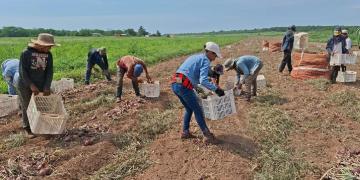EEUU: Idaho grower experimenting with mineral oil in potato seed
An Eastern Idaho seed potato grower is experimenting with mineral oil as a cheap but potentially effective way to limit the transmission of aphid-vectored crop diseases.

Eastern Idaho farmer Clen Atchley is conducting an experiment in his seed potato fields to determine if mineral oil can effectively protect his crops from diseases spread by aphids.
He may start using mineral oil routinely if winter seed-certification testing in Hawaii confirms the 130 acres he sprayed this season with the low-cost protectant harbor less virus than his other seed fields.
Though Atchley is a pioneer with the product in his home state, mineral oil has become a ubiquitous tool among Montana’s early generation potato seed growers in recent years.
A small percentage of disease can mean a substantial economic hit in the earliest stages of seed production, including nuclear seed, which is the first seed crop planted in native soil, or the subsequent crop, called generation 1.
“For nuclear seed and generation 1, I can’t think of a single (Montana) grower who isn’t using mineral oil,” said Nina Zidack, Montana’s seed potato certification director. “A number of them are using it in generation 2, and there are some people who are using it to a limited extent in generation 3.”
Atchley said he decided to give the product a try based on a conversation with Dan Lake, a Ronan, Mont., seed grower, during the National Potato Council’s annual meeting in July. The product is cheap — less than $5 per acre — but Atchley said Montana seed growers spray it on a weekly basis, and application costs can be considerable.
Atchley ultimately opted to try mineral oil in a tank mix this season because he had to aerially apply fungicides every 10 days anyway to control late blight. Atchley said an early spring led to extreme aphid pressure this season, and he used the oil in conjunction with his usual insecticide program.
“If we wind up with considerably less virus, (mineral oil) will be something we use more of for sure,” Atchley said.
Retired University of Idaho Extension potato pathologist Phil Nolte once tried mineral oil in an Idaho trial, with poor results. He suspects he didn’t apply the product often enough.
Montana State University plant pathologist Barry Jacobsen has assisted in mineral oil trials in Hermiston, Ore., with Zidack and Phil Hamm, director of the Hermiston Agricultural Research and Extension Center.
Jacobsen explained mineral oil blocks certain aphid-vectored diseases, such as potato virus Y, from being transmitted from an insect to a leaf, or vice versa. Once the oil dries on a leaf, Jacobsen said it doesn’t easily wash away.
In the Hermiston trials, he said an integrated program involving scouting fields for infected plants, applying insecticide and using mineral oil reduced heavy virus infection by up to 80 percent. He said oil alone cuts infections in half, which is far better than insecticide alone. He said many generation 3 growers in Montana have also had great luck with spraying only field borders, given that aphids often enter fields from the edges. Jacobsen warns growers mineral oil can’t be tank mixed with certain fungicides, such as Bravo.
“If I had to pick something you’re going to spray, oil is by far the best thing,” Jacobsen said.
Fuente: http://www.capitalpress.com/Idaho/20151022/




